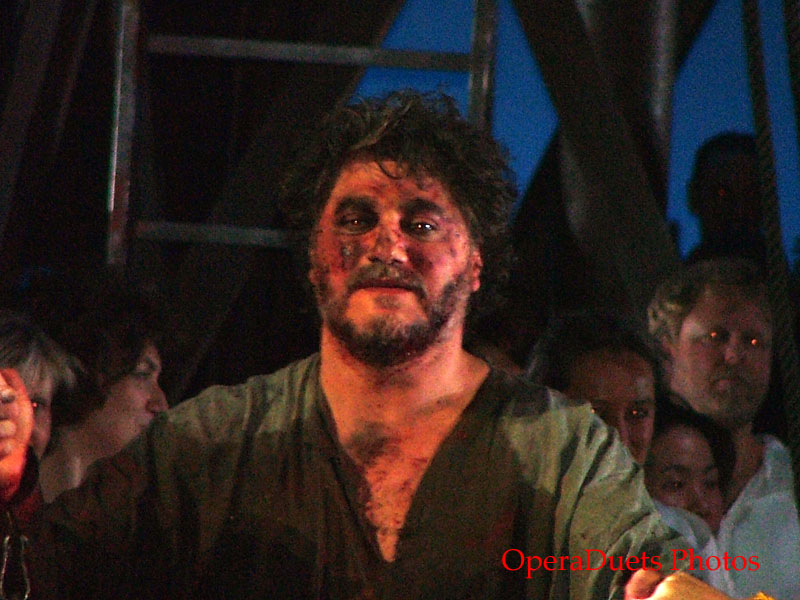2010-10-30 Samson et Dalila (C. Saint-Saëns),Badisches Staatstheater Karlsruhe
Samson = José Cura
Dalila = Julia Gertseva
Abimelech = Lukas Schmid
High Priest = Walter Donati
Ancient Hebrew = Walter Shreyek (statist) / Luiz Molz (voice)
First Philistine = Sebastian Haake
Second Philistine = Alexander de Paula
Messenger = Andreas Heideker
Young Hebrew = Sebastian Shaible
Jochem Hochstenbach, conductor
Inszenierung - José Cura
Ausstattung - José Cura
Einstudierung der Chöre - Ulrich Wagner
Dramaturgie - Annabelle Köhler
Regieassistenz - Eva Schuch

I would love to say that I really loved this production of Samson et Dalila since this was with REGIE UND AUSTATTUNG José Cura. What is great about this production is that the concept works, it makes sense and it does not go against the music or the words in the opera. I think that Regie and Konzept is often made against the story and music and very often just to shock, that is the cheap way to work. Here you have the opposite someone really doing the REGIE as the handiwork it should be. And so here it works. Without earlier knowledge of the opera and story the production works even better. Then there are some errors that directors should try to avoid. One should never have to read the concept of director in order to understand it and it should be obvious who is who. It was not obvious that the children dressed in red was Philistine children. Had the Philistine been dressed in red and not in a formal dark wear (Abimelech, Grand Prêtre) it would have been clear that children in red are Philistine, other children are Hebrew. With some of the important ideas of José Cura is the children, the innocent ones, trying save each other, not caring who is the enemy. Without clarity here much understanding is already lost in act 1.
My other complaints are much more my personal view. In my view it was too much violence showing here. Compared to other "shows" it is not too much violence. But it is José Curas choice to show how violent the regime the Hebrew are under. This does undermine the other idea that José Cura has that Samson is nothing more than a suicide bomber using religion as a pretext for violence. With violence so great must not revolt come and therefore is not Samson forced to become the leader. That is just my view. So Samson is a hero in this production even if Cura is trying to show us that this revolt was not without Hebrew casualties.
In this concept the Old Hebrew is killed by the High Priest in front of the children and women. The children dressed in red then saves more lives from the murderous High Priest. But if you have not read in the program that this means Philistines are saving Hebrews, children saves children, then one important point is lost. Because the Old Hebrew is killed before the "Hymne de joie, hymne de délivrance" sung by the Old Hebrews and other elders this become a sombre song offstage as we see the dead Hebrews are carried into the stage. Still it does not really make sense that the High Priest should shoot the Old Hebrew as he sings "Maudit soit le sein de la femme qui lui donna le jour!". Why shoot a man when he could strangle the woman who might just be Samson's mother or wife? It would have been really chilling. But then the concept would not work, or what...
Here there are no doubt about Dalila. She never loved Samson. This Dalila is a woman that is callous and uses her allures to trap men and to be powerful and rich. I can accept that but I would have loved her to have many layers to her. I find it harder to just accept the sexualization of Dagons priestesses. But then they are just Dalila's tools. It is as if we are to believe that Dalila and her "sisters" hate men because they love women. I find it cheap. And I find it strange that all the priestesses are inside Dalila's hut the Soreck valley.
When the High Priest visits Dalila he is shown as big shadow behind the tall veil. Unfortunately this High Priest as he is singing hiw big shadow makes any tremulus in the hands very visual and that goes against his portrayal as a strong man.
José Cura showed himself as a man capable to create a Samson et Dalila that is really modern and true to the music. The rave reviews was not completely unjustified. And then there is the voice and acting of José Cura. He is the complete Samson. Wonderful singing and acting. Julia Gertseva was Dalila. She is a promising Dalila, her voice is sometimes just short of really opening up and then she could be a Dalila for the ages. Other than that, she is spotless. The other singers was not up to the highest standard where Cura and Gertseva reigned. The chorus was exceptional. The statists did a good job. The children was wonderful.
In the end I will mention the teenager, an invention of José Cura. A long-haired teen-ager that I thought would be like a Samson double. It is an operatic trend of using doubles in opera. But in this production he is just the ardent follower of Samson who idolizes Samson. He is disappointed by Samson when he falls for Dalila, but when he himself is used by Dalila, he understands and forgives and saves the children from the destruction of Samson on Samson's command.




